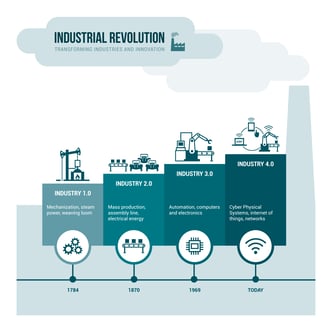A digital workforce reflects the evolution of technology within the modern workplace. This technology is central to the way we do business. As a result, many organisations already use elements of a digital workforce without realising.
The coronavirus pandemic demonstrates why a digital workforce is so crucial to businesses from all sectors. Are you wondering how a digital workforce can help your manufacturing business? Keep reading to find out more about the benefits and how to implement one in your organisation.
What Is a Digital Workforce?
 The term 'digital workforce' is all-encompassing. It refers to all the ways you can digitalise your operations. This digitalisation ranges from email communication to fully automated manufacturing processes. In 2017, Deloitte compiled a report about the digital workforce, which they defined as:
The term 'digital workforce' is all-encompassing. It refers to all the ways you can digitalise your operations. This digitalisation ranges from email communication to fully automated manufacturing processes. In 2017, Deloitte compiled a report about the digital workforce, which they defined as:
In most cases, the digital workforce will not be a physical embodiment of a digital worker. Rather a virtual robot (software) that will be either working in the background or accessed by consumers and co-workers through a command-based interface.
A digital workforce is about leveraging improvements to technology to grow your business. For this reason, it has been described as the fourth industrial revolution. It's set to revolutionise how we create products in the manufacturing industry.
Does talk of robots and automation seem a far cry from how your organisation operates currently? A digital workforce is likely closer than you think. Many manufacturing businesses already use elements of a digital workforce, with uptake accelerating during the coronavirus outbreak.
The pandemic has taught us that technology is indispensable to modern business. Without it, many organisations would not have been able to survive this year.
To comply with strict guidelines, businesses were forced to find new ways of working. These changes include remote working and fewer workers on-site due to social distancing regulations. For example, some companies accelerated the automation of their manufacturing process. Others found innovative ways to enable their employees to fulfil their role remotely, working from home.
Furthermore, many of the components of a digital workforce rely on the IT infrastructure you already have in place. This means implementation of a digital workforce is less intensive than business owners often anticipate. In fact, the automation of the manufacturing process can be complete in a matter of weeks. This simplicity arises because you're not starting from the bottom up. You're building on the aspects of a digital workforce you already have in place.
What Are the Advantages of Digital Workforce?
Are you still not sure what benefit a digital workforce can bring to your organisation? Here are five reasons to consider taking the leap:
1. Increased productivity
The first benefit of a digital workforce is the most obvious — increased productivity. When you automate manufacturing processes, you remove employee fatigue, breaks and working hours from the equation. This means you are able to manufacture more products in less time.
This benefit increases when you're smart about the digitalisation of your workforce. For example, prior to automation, you should observe your current processes. Are there any bottlenecks? Are there any aspects of the manufacturing process that currently hinder productivity? These are the areas to prioritise when moving to a more digital workforce. Focus on making improvements to the aspects of the process that can have the greatest impact.
2. Increased precision

A digital workforce can help resolve this issue, improving accuracy and mitigating the impact of human error.In addition to increased productivity, a move to a more digital workforce provides the opportunity for increased precision. Research suggests human error is a huge problem for the manufacturing industry. Estimates suggest people are responsible for 23% of all unplanned downtime.
3. Stress reduction
A career in manufacturing can be stressful. Demand is high, often with strict quotas to meet each day. In addition to this demand-related stress, employees can also suffer from environmental stress. For example, environmental stress may occur when employees are exposed to high noise levels of vibration. Job insecurity is also a primary concern.
It's a misconception that introducing more technology would increase this stress. Business owners worry a digital workforce would increase employees' anxieties about losing their job to technology. Although this can be a real concern, technology is intended to run alongside them — not replace them. You should communicate this point clearly and effectively. Doing so may reduce employee stress by reducing the demands placed upon your workers. In turn, this can increase job satisfaction.
4. Greater scope for innovation
In line with the above point, a digital workforce provides greater scope for innovation. This improvement occurs because your employees are free to work on more exciting and meaningful projects. Without automation, much of their time is spent on repetitive tasks.
Innovation is key to growth — and a company's workforce is one of its most valuable assets. Reducing the workload of the people who know your manufacturing process inside out can provide incredible results in terms of innovation.
5. An agile production environment
 Manufacturing is a fast-paced industry. If you want to keep up with the competition, you need to find a way to create an agile production environment. This change ensures you can quickly respond to changes within the industry.
Manufacturing is a fast-paced industry. If you want to keep up with the competition, you need to find a way to create an agile production environment. This change ensures you can quickly respond to changes within the industry.
When you're relying on traditional manufacturing processes, this task becomes difficult. A labour-intensive process leaves little scope for change. Instead, the risk of downtime as procedures are amended becomes too high.
A digital workforce changes this, enabling you to work quickly to respond to changes and stay one step ahead of the competition.
How Can Manufacturing Companies Implement a Digital Workforce Strategy?
Are you ready to implement a digital workforce strategy? First, consider the key areas of the business where digitalisation could have the biggest impact.
According to the 2017 report by Deloitte, there are three stages — or 'evolutions' — to progress through:
- Robotic Process Automation (RPA)
- Cognitive computing
- Artificial intelligence
 For most manufacturing companies, RPA is the ideal place to start. It can also have a large impact on your business for a relatively small investment. This change eliminates low complexity production tasks to reduce the burden on your employees.
For most manufacturing companies, RPA is the ideal place to start. It can also have a large impact on your business for a relatively small investment. This change eliminates low complexity production tasks to reduce the burden on your employees.
You should always start with a proof of concept to ensure your idea is fit for purpose. You must then conduct a full business analysis. This will help you determine who should be involved, what the key roles and responsibilities are, and define a full set of requirements.
You also need to know what training your staff require. Consider this both for the implementation itself (e.g., your IT teams) and for its ongoing use.
Once the changes are complete, it's crucial to continue monitoring the manufacturing process closely. You need to determine how well the new solution works and identify any further areas that need attention.
Will Your Business Benefit from the Fourth Industrial Revolution?
Martin Thomas, European Marketing Manager at Radwell said “The fourth industrial revolution relates to the creation of digital workforces within the manufacturing industry. When implemented correctly, a move to a digital workforce can provide a wide range of benefits. This completely transforms both the efficiency and the culture within the business.
In a post-COVID-19 world, many companies will accelerate technological changes to future-proof their business. If you don't want to get left behind, consider how the fourth industrial revolution could catapult your brand to the next level. Get in touch to find out more about how we can help.”









